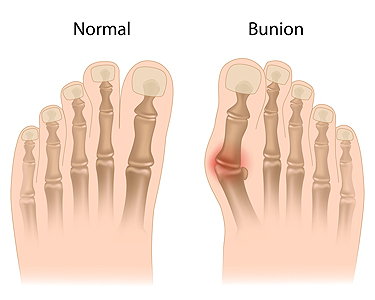Connect With Us
Blog

An ankle sprain occurs when the ligaments that support the joint are overstretched or torn, often as a result of twisting the foot awkwardly or rolling the ankle during activity. These ligaments help prevent excessive motion, and, when injured, they can lead to pain, swelling, and bruising. Some people may also notice warmth, redness, or tingling in the area, in addition to reduced movement and difficulty walking or climbing stairs. The severity of an ankle sprain can range from a minor stretch to a complete tear, and this will affect how long it takes for the ankle to recover. Symptoms may not appear immediately and can develop over several days. A podiatrist can examine your ankle to determine the extent of the injury and recommend the appropriate treatment. In some cases, surgery may be needed if the ligament has ruptured. Prompt care can also help prevent long-term problems, such as chronic instability or repeated sprains. If you have sprained an ankle, it is suggested that you schedule an appointment with a podiatrist for an exam and treatment as quickly as possible.
Ankle sprains are common but need immediate attention. If you need your feet checked, contact Robert Hutchison, DPM, FACFAS from Lower Keys Foot & Ankle Surgery. Our doctor can provide the care you need to keep you pain-free and on your feet.
How Does an Ankle Sprain Occur?
Ankle sprains take place when the ligaments in your ankle are torn or stretched beyond their limits. There are multiple ways that the ankle can become injured, including twisting or rolling over onto your ankle, putting undue stress on it, or causing trauma to the ankle itself.
What Are the Symptoms?
- Mild to moderate bruising
- Limited mobility
- Swelling
- Discoloration of the skin (depending on severity)
Preventing a Sprain
- Wearing appropriate shoes for the occasion
- Stretching before exercises and sports
- Knowing your limits
Treatment of a Sprain
Treatment of a sprain depends on the severity. Many times, people are told to rest and remain off their feet completely, while others are given an air cast. If the sprain is very severe, surgery may be required.
If you have suffered an ankle sprain previously, you may want to consider additional support such as a brace and regular exercises to strengthen the ankle.
If you have any questions please feel free to contact our office located in Key West, FL . We offer the newest diagnostic and treatment technologies for all your foot and ankle needs.

Gout is a form of arthritis that often affects the feet. The joint of the big toe is the most common site, but the ankles and midfoot can also be affected. Gout develops when uric acid builds up in the blood and forms sharp crystals in the joints, leading to sudden, intense pain, swelling, and redness. These gout symptoms often come on quickly, frequently at night, and may reach peak severity within a day. Gout attacks, termed flare-ups, usually resolve within a week, but without treatment, the condition often returns and can affect multiple joints over time. Risk factors for gout include being overweight, having high blood pressure or diabetes, and consuming foods and drinks high in purines, such as red meat and beer. Repeated attacks may lead to hard crystal deposits called tophi, which can permanently damage bone and joint tissue. A podiatrist can help confirm a diagnosis of gout and provide treatment to manage its symptoms and prevent further joint damage. If you have symptoms of gout, it is suggested that you schedule an appointment with a podiatrist for an exam and effective treatment solutions.
Gout is a foot condition that requires certain treatment and care. If you are seeking treatment, contact Robert Hutchison, DPM, FACFAS from Lower Keys Foot & Ankle Surgery. Our doctor will treat your foot and ankle needs.
What Is Gout?
Gout is a type of arthritis caused by a buildup of uric acid in the bloodstream. It often develops in the foot, especially the big toe area, although it can manifest in other parts of the body as well. Gout can make walking and standing very painful and is especially common in diabetics and the obese.
People typically get gout because of a poor diet. Genetic predisposition is also a factor. The children of parents who have had gout frequently have a chance of developing it themselves.
Gout can easily be identified by redness and inflammation of the big toe and the surrounding areas of the foot. Other symptoms include extreme fatigue, joint pain, and running high fevers. Sometimes corticosteroid drugs can be prescribed to treat gout, but the best way to combat this disease is to get more exercise and eat a better diet.
If you have any questions please feel free to contact our office located in Key West, FL . We offer the newest diagnostic and treatment technologies for all your foot and ankle needs.

Bunions are a foot deformity that may begin with subtle signs and gradually progress to more noticeable discomfort. Early symptoms of bunions include swelling around the joint at the base of the big toe, along with redness that signals inflammation. Many people experience numbness and a burning sensation in the affected area. Over time, the foot shape may change as the big toe shifts toward the other toes, altering normal alignment. The altered pressure distribution often leads to the formation of calluses and corns on the inner side of the foot. Pain and discomfort during walking or prolonged standing may indicate that the condition is worsening. If you have any of the above symptoms, it is suggested that you visit a podiatrist who can offer you relief and treatment options.
If you are suffering from bunions, contact Robert Hutchison, DPM, FACFAS of Lower Keys Foot & Ankle Surgery. Our doctor can provide the care you need to keep you pain-free and on your feet.
What Is a Bunion?
A bunion is formed of swollen tissue or an enlargement of boney growth, usually located at the base joint of the toe that connects to the foot. The swelling occurs due to the bones in the big toe shifting inward, which impacts the other toes of the foot. This causes the area around the base of the big toe to become inflamed and painful.
Why Do Bunions Form?
Genetics – Susceptibility to bunions are often hereditary
Stress on the feet – Poorly fitted and uncomfortable footwear that places stress on feet, such as heels, can worsen existing bunions
How Are Bunions Diagnosed?
Doctors often perform two tests – blood tests and x-rays – when trying to diagnose bunions, especially in the early stages of development. Blood tests help determine if the foot pain is being caused by something else, such as arthritis, while x-rays provide a clear picture of your bone structure to your doctor.
How Are Bunions Treated?
- Refrain from wearing heels or similar shoes that cause discomfort
- Select wider shoes that can provide more comfort and reduce pain
- Anti-inflammatory and pain management drugs
- Orthotics or foot inserts
- Surgery
If you have any questions, please feel free to contact our office located in Key West, FL . We offer the newest diagnostic and treatment technologies for all your foot care needs.

